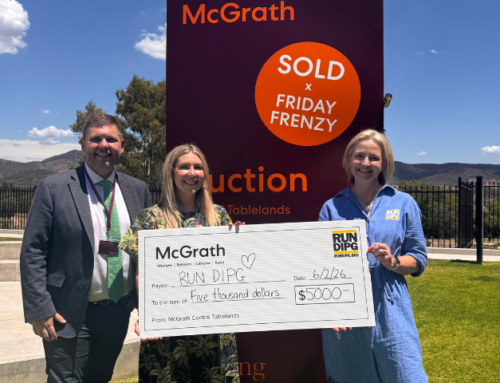The Newcastle Herald
February 23, 2019
If Dr Matt Dun could spend every last cent he had on time, he would buy more.
Instead, he is running in a race against it to find the missing pieces of the puzzle that could save children like his own little girl, Josephine.
The University of Newcastle and HMRI biologist has spent almost a decade unearthing vital insights into some of the most devastating types of cancer, including children’s cancers.
But in February, his crusade became agonisingly personal when Josephine – now three – was diagnosed with a brain stem cancer called Diffuse Intrinsic Pontine Glioma, or DIPG.
“The average survival is about 10 months,” Dr Dun said. “That means that half the kids who get it will live less than that. About 10 per cent of kids with DIPG live for two years, and 1 per cent of kids live for five years.”
Dr Dun continues to lead leukaemia research projects, but he has also become driven to use his knowledge and skills to dig deeper into DIPG – a “ferocious,” inoperable cancer that almost exclusively affects children.
“My team of researchers all see the power of what they are doing, and the potential of what they are doing,” he said. “They are working hard, and getting good results. I just need to make sure they have the funding to continue to unravel whatever they are looking into, whether it’s glioma or leukaemia.”
He is “cautiously optimistic” they will be able to translate some of their initial discoveries into clinical trials and treatments for DIPG.
“Whether it is in time for Josephine, time will tell,” Dr Dun said. “Clinical trials are still a little while, and a lot of money, away.”
Josephine – affectionately known as Josie – was diagnosed with DIPG after she suddenly had trouble walking.
Her treatment, which involved months of radiotherapy under general anaesthetic in Sydney, had been traumatic for their whole family. But particularly Josephine.
“I can’t imagine what she’s going through in terms of the pain, the symptoms, the loss of mobility, the frustrations, the chemo, the drugs, the nagging of her parents to come into hospital. Being subjected to treatments and needles, and being poked and prodded by different people every five minutes,” he said. “For the moment, while she is with us, I feel like at least I can try to look up things and read and try to come up with a strategy that potentially might help.
“At the moment, while we still have her, it gets me out of bed every day.”
On Sunday, Dr Dun ran the half marathon in the Lake Macquarie Running Festival as part of his training regime for the Blackmores Sydney Marathon in September.
He hopes to qualify for the Boston Marathon alongside his fundraising team, RUN DIPG, to bring the world’s attention to the devastating disease.
“These children are totally innocent,” he said.
Dr Dun has become part of a community of DIPG parents all suffering the indescribable agony of watching their children battle an illness with “horrendous” survival rates.
Many have come to view him as a champion for the cause.
DIPG’s location in the brain stem made it difficult to treat.
Dr Dun said he and his wife Phoebe, a local GP who is pregnant with their third child, were grateful for the “amazing” support of their family, friends, and community.
A recent community event – The Josie Dun Gift – raised more than $70,000.
“Everyone feels like they want to help, and they know without research dollars there are no treatments, no cures, no improved well-being. So they have taken it upon themselves to do whatever they can, in their own time, to try to help us.





